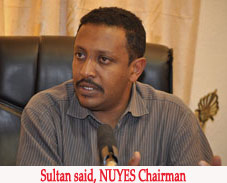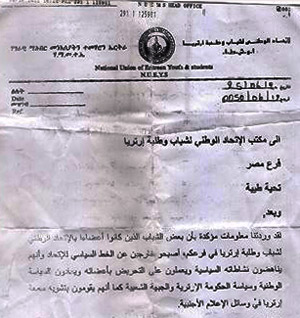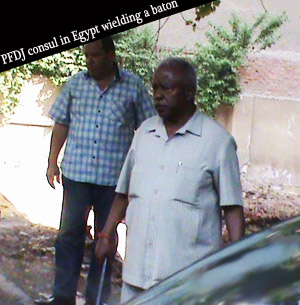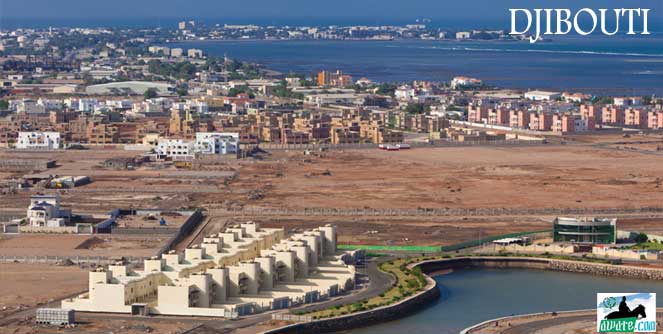Government Bullying A Citizen: A Personal Testimony

In North America, Europe and, to some extent, Australia, the Eritrean ruling regime, PFDJ, does not wield as much power and its intimidation campaigns are not as effective as they used to be. This is because Eritreans in North America, Europe and Australia are not dependent on the PFDJ for residence and work permits. In the Middle East, however, the PFDJ remains as intimidating and as bullying as ever. What we are including below is its power of intimidation and how some brave souls are standing up to it despite the high risks associated with it.
For those who may not be aware, in the Middle east, most Eritreans hold Eritrean passports and they cannot move an inch without it. There is no room for political asylum in almost all Middle eastern countries. Therefore, Eritreans are under the full control of the PFDJ embassies and consulates, except for a few brave and daring Eritreans who risk everything and face the PFDJ injustice. In Egypt, where Eritreans have the oldest student union which has now been taken over by the PFDJ regime, many are victimized. Scholarships, travel opportunities and other consular services are denied them and there are no asylum institutions in these countries.
In the latest stint, when some Eritreans bravely demonstrated in front of the Eritrean embassy, the consul general came out to threaten them holding a baton.
In another incident, in a meeting, he threatened them that he has diplomatic immunity and carries a gun, and that anyone who comes to his consulate to demonstrate risks being shot and killed, “by my own pistol.”
Egypt has in the past years forcibly returned thousands of Eritrean asylum seekers without considering their refugee claims. This act is a breach of international laws which forbid host nations from deporting asylum seekers to countries where they could face a serious risk of persecution upon return.
According to credible sources, in the past, Egypt’s Interior Ministry officials have given Eritrean embassy officials access to detained Eritreans, including asylum seekers registered by UNHCR in other countries, to help prepare travel documents for deportation.
In another incident, four Eritreans who have refused to bow to the PFDJ have been expelled from the Union under which they have the official Egyptian recognition, and they risk their scholarships and other opportunities since they cannot get any consular help.
One of them is Hamid Adem Idris (known as Al Ajeb), a man who confronted the PFDJ injustices, and is risking his well-being. He carries an Eritrean passport which has since been revoked and he is in precarious situation.
Hamid is an activist and, together with a few of his colleagues, he has been part of the team that has challenged the PFDJ in Egypt, by emboldening and organizing the youth to hold demonstrations against the unjust practices of the Eritrean regime that wishes to oppress citizens at home and abroad.
Earlier this year, Hamid managed to secure a hearing at Mejlis Al Shaab, the Egyptian parliament, and advocated for the cause of the Eritrean people.
This triggered a letter from Sultan Saeed, Chairperson of the National Union of Eritrean Youth and Students (NUEYS) (pictured.) In the letter, he lists names of individuals from the union and warns that anyone who is against the PFDJ should be expelled as well. The translation of the document, as well as the personal testimony of one of the four individuals, follows:
To the Office of the National Union of Eritrean Youth and Students
Cairo Branch,
Greetings,
nuyes1We have received confirmed information that some youth who were members of the National Union of Eritreans Youth and Students in your branch have stepped outside the political line of the union and they are against its political activities and they work to agitate its members, and are against the national policies of the Eritrean Government, and the People’s Front [PFDJ], and they are involved in smearing the name of Eritrea in foreign media outlets.
 Therefore, the National Union of Eritrean Youth and Students, since it is part and parcel of the Popular front for Democracy and Justice , and because it is grounded on the policies of the Eritrean Government in all its details, [has decided that] their likes should not be given membership and anyone who is against the national policies should not be protected under its wings.
Therefore, the National Union of Eritrean Youth and Students, since it is part and parcel of the Popular front for Democracy and Justice , and because it is grounded on the policies of the Eritrean Government in all its details, [has decided that] their likes should not be given membership and anyone who is against the national policies should not be protected under its wings.
Therefore, it has decided to cancel completely the membership of the youth, whose name follows, and to exclude them from everything related to its activities. And we give you full mandate to cancel the membership of anyone who is involved in such inimical activities which is against membership [rules], and to notify the central office of the National Union of Eritrean Youth and Students.
[We also bring to your attention to] be alert in the face of such enmities and to work diligently in educating the youth and make them leaders, able to lead the future of their nation without falling in the designs of the enemies.
The names of the youth whose membership is cancelled are:
1. Zaki Osman Adem
2. Aman Yassin Ahmed
3. Hamid Adem Idris
4. Mohammed Nur Shems
Seal of NUEYS
Signed, Sultan Saeed
Chairperson
______________________________________________
PERSONAL TESTIMONY
Name: Hamid Adam Idris (aka Al Ajeb)
nationality: Eritrean
Education: Completed High school and university at Azhar
Social Activities:
* Worked at the Eritrean Students Union as a member of the executive office from 2006 to 2007.
* Served as cultural secretary and Secretary of trips and Entertainment at the General Federations and Unions of African students in Egypt; also held the position of secretary-general of the Supreme Advisory Council for the same Union
* Worked as Secretary of external relations for the Federation of East African Students and member of student parliament at Al Azhar.
The first problem
My differences with the Eritrean embassy in Cairo started in 2006, when it prevented students from attending university. It was our duty to defend the rights of students to the extent that we declared a sit-in at the embassy in order to solve the students’ educational problems. But the embassy threw at us charges that we are dissenters and closed the Union. Then wrote about that on the opposition websites regarding the issue of the embassy that deprived students of university education. At that time, I served as Secretary of Sports and Recreation.
The second problem
In 2010, I wrote and reada statement at the International Symposium of Azhar graduates regarding the Eritreanregime’s policy that prevents students from attending Azhar; that statement was published in the Al Azhar Journal of Azhar and I was summoned at the embassy.
The third problem
In 2011, I participated in the formation of May 24 Eritrean Youth Movement after the Egyptian revolution began. I started to write messages for young Eritreans in Cairo on February 5, 2011. And on February 17, 2011, we announced the formation of the movement–the messages are still in the outgoing messages folder on Facebook. When the embassy learned about this, it started threatening me not to continue in the activities but I didn’t stop. On May 22, 2011, the May 24 movement held its first demonstration in front of the Eritrean embassy and some Egyptian newspapers, among them Masry Al-Youm, reported it.
On July 27, 2011 we organized a demonstration in front of the Eritrean Embassy to denounce the kidnapping of girls from the village Ad Ali-Bakhit where their parents were killed when they confronted the regime. Al-Ahram newspaper conducted a meeting with five members of May 24, and I was one of the five.
May 24 Youth Movement organized a seminar regarding human trafficking and it was attended by human rights activists and media and some ambassadors, including the Australian ambassador–the seminar was held on February 5, 2012.
On May 22, 2012 the youth movement held a demonstration in front of the Embassy of Eritrea in the presence of a large number of Egyptian police.
The movement organized an Eritrean cultural day at the Abdul Moneim Al Sawi center in cooperation with Al Shrouq Eritrean heritage and arts group.
The consequences of my interviews with television stations and my visits to places where young Eritrean who escape from their country are detained:
I conducted three television interviews with Al Hiwar television channel.
A. An interview on August 11, 2011; the episode was scheduled to air on May 24 (Eritrean Independence Day)
B. I was a telephone guest at Al Hiwar channel. The program was about the situation of youth in Egyptian prisons in my capacity as in charge of the Eritrean detainee affairs. That was on May 22, 2013.
C. A ninety-minute interview on September 25, 2011 with Al Mehwer television channel together with two other members of the May 24 Movement. After the interview, the Eritrean Embassy sent a fax message to the channel and stated that the guests the channel hosted is a group of people who abandoned their responsibilities, are clowns who agitate tribal sentiments.
D. On February 2, 20012, I was interviewed by Al Bagdadya channel together with a lady from May 24 movement.
E. There is a video clip shot by Al Nahar channel showing me distributing aid to detained Eritrean youth.
F. An interview with Al Jazeera on January 29, 2013, after the May 24 movement stormed the Eritrean Embassy in Cairo.
G. On March 2013, there is a video clip by Al Shaab channel where I presented the issue ofhuman trafficking in which Eritreans are victims to the committee of African Affairs at the Egyptian Parliament.
I visited the Eritreans detained in Egyptian prisons. During 2011 and 2012, I visited the Aswan prison three-times and we presented aid to 250 youth, women and children.
I have also visited three-prisons in Sinai: Ruman, B’er AlAbd and Al Araish prisons.
I also visited Suez prison. I also visited Al Ismaelia prison five times; that is where more than 300 youth, women and children were imprisoned.
I have some pictures of the prisons but others I didn’t shoot.
As a result of these activities, a fax message was sent to the Eritrean embassy from Eritrea accusing me and three others of aggression against the nation and defaming the country’s image in foreign media. The message instructed to have our membership from the student union revoked.
On television interviews I talked about human trafficking and the involvement of the Sinai Bedouins in this trade and therefore received telephone calls threatening me with revenge because, as they say, I tarnished the name of Sinai tribes. One time, they almost baited me by making excuses to help the refugees, but finally I discovered it was a trick.
In one of its meetings inside the embassy, the Eritrean embassy referred to me as a spy and accused me that I persuade Eritrean youth in Egyptian prisons not to return to Eritrea and instead go to Ethiopia.
The Issue of the Egyptian Ship Captain
An Egyptian captain was imprisoned in Eritrea when he entered the Eritrean waters with permission of Eritrean authorities due to malfunction in his ship. He was imprisoned for several months in Eritrea when Egyptian intelligence and the presidency intervened to have him released. After the captain arrived in Egypt, the press wrote about an exchange of prisoners between Eritrea and Egypt in order to release the captain. Therefore, we met at his home in Kefr AlDewar, in Al Buheira and he told us, literally, that “…an exchange of prisoners didn’t happen but the Eritrean government had asked for a group young dissidents in Cairo, specifically you who are holding demonstrations. You need to be very careful.”
His mother said that President Mursi told her that her son is needed as an exchanged for young people who want to do what the Egyptian youth did in the [Egyptian] Revolution of the 25th [of January.]
On March 17, 2013, there was a celebration of International Women’s Day at the premises of the Union of Eritrean Students and I went there. But before the opening of the ceremony, a person from the embassy staff took me to the corner and told me that I am required to leave the place. I asked why. And he told me that the Women’s Union does want me there. Thereafter, I contacted the President of the Women’s union and asked her why she didn’t want my presence. She said, “We in the Union did not object to your presence, it is the consul who objected…. “
We at the May 24 movement wrote a statement on our newsletter condemning the intervention of the Embassy in the affairs of the Women’s Union and we characterized the actions of the consul as cowardly and his interference as childish and since then I do not go to places where there are a group of Eritreans who support such actions.
Based on the above, I am now under a threat from many parties:
First, the regime in Eritrea has accused me of aggression against the nation and of distorting the reputation of the state and of arousing tribal grudges–this is a direct threat from the Eritrean regime.
Second: The Bedouins of Sinai are following me after I mentioned them in several television interviews to the extent that they tried to trick me to travel out of Cairo on top of their threatening calls.
Third: the embassy wants to harm me under any pretext and on one occasion they have threatened they will use thugs to get rid of me.
awateteam@awate.com
awate.com
inform. inspire. embolden. reconcile.




Awate Forum